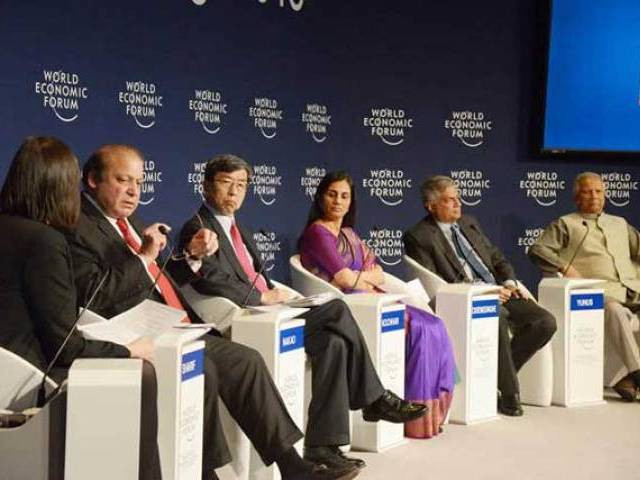And the poor get poorer
The Oxfam report titled “An economy for the 1%” says global crisis of inequality is reaching ever greater heights

Prime Minister Nawaz Sharif is speaking on Perspective of Pakistan in the Regional Context at a panel discussion on Regions in Transformation-South Asia during Annual Meeting 2016 World Economic Forum at Davos, Switzerland on January 21, 2016. PHOTO: PID

Prime Minister Nawaz Sharif and his team were at Davos and seem to have been well received, at least superficially. He met Queen Maxima of the Netherlands on January 22. She is to be visiting Pakistan in the near future (the Netherlands is a significant donor to NGOs in the health and education sectors that work in Pakistan and maintain a substantial country office). The prime minister spoke of ways in which his government was “transforming human capital into a driver for growth” and that the young people of the country were being empowered by his government by the provision of soft loans for business start-ups. Her Majesty was doubtless impressed and we will welcome her when she arrives — but against the background of big money in Davos talking to other big money, a report was quietly released by Oxfam that should be required reading for both.
The Oxfam report is titled “An economy for the 1%”. It says that the global crisis of inequality is reaching ever greater heights and that the richest one per cent now have more wealth than the rest of the world combined. Those with the wealth use offshore tax havens to park their wealth — $7.6 trillion in the estimation of Oxfam — and the global fight against poverty is never going to be won unless the crisis of inequality is addressed. Among the many other battles that Pakistan is fighting, the one against poverty has seen little by way of victories in recent years, indeed the government — as has its predecessors — stoutly resisted all attempts to objectively quantify or define poverty as a proportion of the population. There are no votes in making poverty an issue even though most of those who vote for those who are inevitably rich are themselves poor, many desperately so.
Those who compiled the Oxfam report calculated that just 62 individuals, less than the load capacity of a London double-decker bus, had the same wealth as 3.5 billion people or precisely half of the global population. This figure is down from 388 individuals in 2010 indicating that wealth is being concentrated in an ever-shrinking band – 53 men and nine women. The wealth of the bottom-half of the population fell by a startling 41 per cent in the last five years. The average annual income of the poorest 10 per cent has risen by less than $3 in 25 years and their daily income by less than a cent, one hundredth part of a dollar, every year.
The global economy viewed as a whole is skewed to make the rich richer and the poor poorer, and viewed through the prism of the Pakistan experience since Partition — or India for that matter or most of the other developing nations — that inbuilt inequality is set to remain for the foreseeable future. That is the future for most Pakistanis, which means that this government, and its successors, must make a greater effort than it currently is to rebalance the scales of inequality. A faint hope, we opine.
Published in The Express Tribune, January 25th, 2016.
Like Opinion & Editorial on Facebook, follow @ETOpEd on Twitter to receive all updates on all our daily pieces.















COMMENTS
Comments are moderated and generally will be posted if they are on-topic and not abusive.
For more information, please see our Comments FAQ